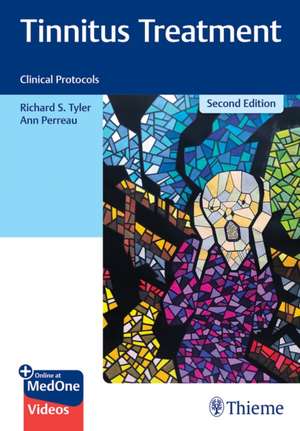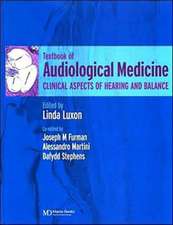Tinnitus Treatment – Clinical Protocols
Autor Richard Tyler, Ann Perreauen Limba Engleză Paperback – 22 feb 2022
The quintessential clinical guide for audiologists on tinnitus and hyperacusis patient management Since publication of the first edition in 2005, new developments have impacted the treatment paradigm for tinnitus, such as sensory meditation and mindfulness. Tinnitus Treatment: Clinical Protocols, Second Edition, by world-renowned tinnitus experts and distinguished authors Richard S. Tyler and Ann Perreau provides comprehensive background information, up-to-date strategies, essential tools, and online supplementary materials grounded in years of clinical experience and research. It fills a gap in graduate education and available materials to empower audiologists to effectively treat patients suffering from bothersome to severely debilitating symptoms associated with tinnitus or hyperacusis. The textbook includes 15 chapters, starting with three chapters on tinnitus models, treatment approaches, and self-treatment options. The next three chapters summarize counseling approaches for audiologists and psychologists, including introduction of the three-track psychological counseling program for managing tinnitus. Chapters 7 and 8 discuss the use of hearing aids in patients with hearing loss-related tinnitus and sound therapy using wearable devices. Chapter 9 covers smartphone apps for tinnitus assessment, management, and education and wellness, including discussion of limitations. The last six chapters provide guidance on tinnitus management topics including treating children, implementing outcome measures, hyperacusis treatment, and future directions. Key Features New relaxation/distraction tactics including meditation, mindfulness, guided imagery, biofeedback, progressive muscle relaxation, art and music therapy, exercise, and exploration of new hobbiesTreatment guidance for patients with tinnitus associated with Meniere's disease, vestibular schwannoma, unilateral sudden sensorineural hearing loss, and middle ear myoclonusDiscussion and research-based evidence covering Internet-delivered self-help treatment strategiesNew supplemental videos, brochures, handouts, questionnaires, and datasheets enhance knowledge, scope of practice, and incorporation of effective approaches into clinical practice This is a must-have resource for every audiology student and advanced courses, as well as essential reading for all audiologists who feel underprepared in managing tinnitus and/or hyperacusis. This book includes complimentary access to a digital copy on https://medone.thieme.com.
Preț: 510.89 lei
Preț vechi: 537.78 lei
-5% Nou
97.77€ • 101.86$ • 81.29£
Carte disponibilă
Livrare economică 20 ianuarie-03 februarie 25
Livrare express 04-10 ianuarie 25 pentru 45.83 lei
Specificații
ISBN-10: 1684201713
Pagini: 240
Ilustrații: Beilage: Video
Dimensiuni: 182 x 259 x 19 mm
Greutate: 0.74 kg
Ediția:2. Auflage
Editura: MM – Thieme
Descriere
The quintessential clinical guide for audiologists on tinnitus and hyperacusis patient management Since publication of the first edition in 2005, new developments have impacted the treatment paradigm for tinnitus, such as sensory meditation and mindfulness. Tinnitus Treatment: Clinical Protocols, Second Edition, by world-renowned tinnitus experts and distinguished authors Richard S. Tyler and Ann Perreau provides comprehensive background information, up-to-date strategies, essential tools, and online supplementary materials grounded in years of clinical experience and research. It fills a gap in graduate education and available materials to empower audiologists to effectively treat patients suffering from bothersome to severely debilitating symptoms associated with tinnitus or hyperacusis. The textbook includes 15 chapters, starting with three chapters on tinnitus models, treatment approaches, and self-treatment options. The next three chapters summarize counseling approaches for audiologists and psychologists, including introduction of the three-track psychological counseling program for managing tinnitus. Chapters 7 and 8 discuss the use of hearing aids in patients with hearing loss-related tinnitus and sound therapy using wearable devices. Chapter 9 covers smartphone apps for tinnitus assessment, management, and education and wellness, including discussion of limitations. The last six chapters provide guidance on tinnitus management topics including treating children, implementing outcome measures, hyperacusis treatment, and future directions. Key Features New relaxation/distraction tactics including meditation, mindfulness, guided imagery, biofeedback, progressive muscle relaxation, art and music therapy, exercise, and exploration of new hobbiesTreatment guidance for patients with tinnitus associated with Meniere's disease, vestibular schwannoma, unilateral sudden sensorineural hearing loss, and middle ear myoclonusDiscussion and research-based evidence covering Internet-delivered self-help treatment strategiesNew supplemental videos, brochures, handouts, questionnaires, and datasheets enhance knowledge, scope of practice, and incorporation of effective approaches into clinical practice This is a must-have resource for every audiology student and advanced courses, as well as essential reading for all audiologists who feel underprepared in managing tinnitus and/or hyperacusis. This book includes complimentary access to a digital copy on https://medone.thieme.com.
Cuprins
1 Neurophysiological Models, Psychological Models, and Treatments for Tinnitus
2 Treating Tinnitus in Patients with Otologic Conditions
3 Internet-Delivered Guided Self-Help Treatments for Tinnitus
4 Tinnitus Activities Treatment
5 Three-Track Tinnitus Protocol: Counseling Emphasizing the Patient, the Clinician, and the Alliance
6 The Psychological Management of Tinnitus-Related Insomnia
7 Optimizing Hearing Aid Fittings for Tinnitus Management
8 Combining Sound Therapy with Amplification
9 The Clinical Relevance of Apps for Tinnitus
10 Distractions, Relaxation, and Peace with Tinnitus: Guided Imagery, Meditation, Mindfulness, and More
11 Tinnitus in Children
12 Measuring Tinnitus and Reactions to Tinnitus
13 Hyperacusis
14 Navigating Future Directions in Tinnitus Treatment
15 Establishing a Tinnitus and Hyperacusis Clinic










